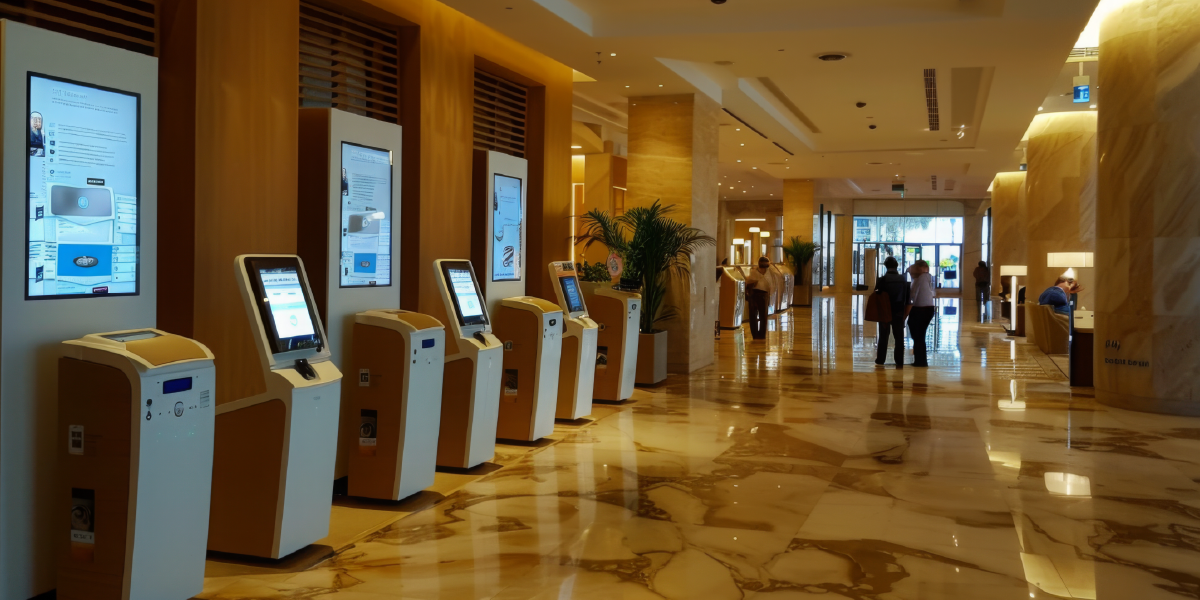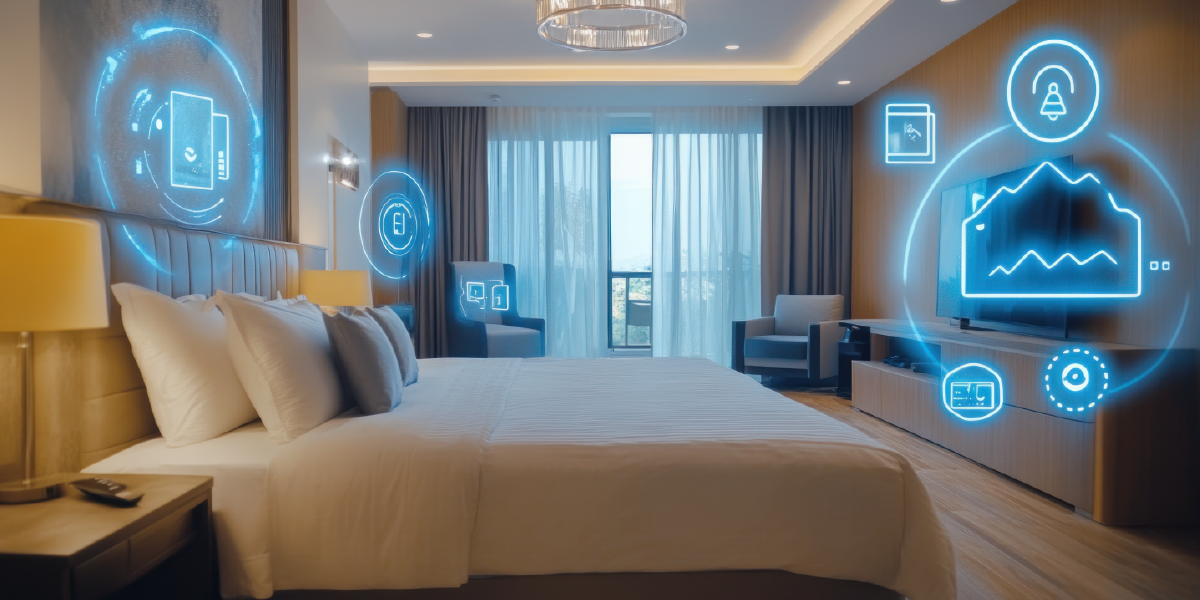Artificial Intelligence continues to dominate industry conversations, from conference stages like HITEC 2025 to vendor demos, keynote sessions, and executive roadmaps. Yet for many hospitality leaders, one fundamental question remains:
What can AI realistically do for my business today?
While the potential is significant, the path forward is often unclear. Between ambitious product demos and sweeping future promises, distinguishing between meaningful innovation and short-lived trends has become increasingly difficult.
Some common talking points are: what’s real, what’s hype, and what’s worth investing in now?
At Sirma Group, we work closely with hotel operators, hospitality tech providers, and venue managers who want clarity, practicality, and a strategy for measurable value.
This article offers a grounded look at how AI is being applied in hospitality today (what’s working, what’s holding teams back, and how to approach adoption in a way that’s strategic and focused on sustainable business growth).
What’s Driving the Push for AI in Hospitality?
Artificial Intelligence’s adoption in hospitality is growing, not so much as a novelty now, but to solve real operational constraints.
It’s important to note that, in this context, AI is not about replacing staff, but relieving pressure on overstretched teams, addressing systemic inefficiencies, and creating the space for staff to focus on high-value, human-centered service.
Across the sector, several structural challenges are converging:
- Persistent labor shortages. Recruiting and retaining staff, particularly in front-of-house and housekeeping roles, remains an ongoing challenge for many properties.
- Tightening margins. Rising operational costs, inflation, and increased wage pressures are leaving little room for inefficiency.
- Rising guest expectations. Today’s travelers expect digital convenience alongside personal service, creating a new standard that is difficult to deliver consistently without the right support.
- Operational inefficiencies. Legacy systems, siloed data, and manual processes often slow teams down, which undermines both productivity and the guest experience.
Curious how these trends played out at HITEC 2025? Read our full recap for a closer look at the innovations shaping hospitality’s future.
Where AI Is Already Delivering Value
While much of the conversation in hospitality still revolves around potential, several applications are already delivering measurable value, particularly when deployed with clear operational intent.
Here are three areas where AI is quietly transforming the way hospitality businesses operate:
1. Automating Repetitive Administrative Tasks
From reservation confirmations and guest messaging to shift scheduling and reporting, many daily tasks are repetitive, time-consuming, and resource-heavy. AI can efficiently handle these workflows, freeing staff to focus on the interpersonal aspects of hospitality that truly differentiate the guest experience.
2. Enhancing (Not Replacing) Staff Capabilities
Unlike what many fear, AI’s role is not to replace people, but to support them.
-
Recommendation engines can help concierge teams provide more relevant suggestions.
-
Dynamic pricing tools empower revenue managers with faster, data-driven insights.
-
Translation tools break down communication barriers across languages and cultures, especially valuable in global hospitality settings.
3. Driving Cost-Efficiency Through Smarter Operations
Of course, AI-powered analytics are also improving decision-making behind the scenes. In other words, AI helps reduce waste and improve consistency by optimizing areas like energy consumption, staff scheduling, inventory management, and even housekeeping workflows.
This not only lowers costs, but it further creates the operational stability needed to scale service without overextending teams. A win-win.

But… There Are Real Concerns
Even though AI has significant potential, hospitality businesses are right to be cautious. That’s because without the right strategy, even well-intentioned implementations can create friction, not progress.
Here are the concerns we hear most often, and why they matter:
Loss of Personal Touch
Hospitality is built on human connection. When automation begins to replace guest interactions instead of supporting them, the experience can quickly feel impersonal or transactional. And this is especially problematic in high-touch environments, where empathy, attentiveness, and personalization are core to the brand promise.
AI should enhance the guest experience, not dilute it. Used thoughtfully, it enables staff to spend more time on meaningful, in-person moments, rather than pulling them away to manage backend tasks.
Guest Data Security
AI tools depend on access to large volumes of data. In hospitality, that often includes sensitive information such as passport details, payment credentials, personal preferences, among others.
Without strong data governance, the risks to guest trust (not to mention brand reputation) are substantial.
This concern was echoed repeatedly at HITEC 2025. As Rodd Herron, VP of Hospitality at Sirma, noted during booth discussions:
Everyone in the hospitality industry is excited about AI, but there’s still real hesitation when it comes to data. Guests are trusting hotels with incredibly personal information. If the tech can’t guarantee privacy and security, it won’t matter how advanced the features are.
The takeaway is clear: hotel’s ability to protect and respect guest data will directly influence how successfully they adopt AI-driven tools in the years ahead.
Unclear ROI
Many businesses are unsure how to quantify AI’s impact. And it’s no wonder. Without a clear link between the technology and measurable outcomes, investments feel speculative.
This hesitation is justified. It’s why implementation should begin with well-defined objectives and the right metrics, whether it’s cost savings, time efficiencies, or guest satisfaction.
And it’s why selecting the right partner is critical. One that can connect strategic goals to system capabilities, and guide the journey from insight to return.
What to Look for in a Hospitality Tech Partner
For hospitality leaders exploring AI, the technology itself is only part of the equation. Just as important is the partner behind it; the one who ensures that innovation translates into operational success.
In this case, choosing the right partner for your business means looking beyond features and functions. It means finding someone who understands the realities of hospitality and can guide you through both implementation and long-term impact.
Here’s what that looks like in practice:
Clarity over complexity
The best partners bring transparency to the process. This means clearly explaining what the AI does, why it matters, and how it fits into your business, not just in the abstract, but in the day-to-day.
This clarity builds trust with the tool, thus helping internal teams get on board without the usual tech adoption resistance.
Modular, not monolithic
This is an important one: AI should work with your systems, not against them.
Look for solutions that are flexible enough to integrate with your existing tech stack, and modular enough to scale as your needs evolve, without requiring a full-system overhaul.
This matters because that flexibility is key to ensuring progress doesn’t come at the cost of unnecessary disruption.
Long-term partnership, not one-off installs
Here’s one thing to keep in mind: adopting AI is not a one-time event, but an ongoing process.
The right partner supports you beyond go-live: training teams, refining usage, and helping you extract long-term value as your goals shift. And this kind of engagement will help ensure the solution becomes a sustained advantage.
How to Approach AI in Hospitality: A Strategic Starting Point
The goal isn’t to implement AI for its own sake, but to leverage it in ways that deliver measurable value (through greater operational efficiency, a more empowered workforce, and an elevated guest experience).
That said, identifying where AI fits within your strategic roadmap isn’t always straightforward. With so many emerging tools and overlapping promises, it takes a clear understanding of your business priorities to separate high-impact opportunities from distractions.
Here’s our advice on how to start:
1. Begin with real-world problems, not tech trends
Don’t start with the question, “What AI tool should we use?”
Rather, start with: “Where are we losing time, money, or guest satisfaction?”
That’s where AI will give you the clearest path to value.
2. Look for early wins that prove impact
Focus on initiatives that are relatively simple to implement but deliver visible results within a few months. These quick wins build internal confidence, demonstrate ROI early, and create the momentum needed to expand AI use more strategically across departments.
3. Think in systems, not silos
AI works best when it complements your existing operational landscape. And the most effective solutions are those that integrate naturally into your current processes and technologies, strengthening what already works rather than forcing a complete overhaul.
In this context, seamless integration is just as critical as core functionality.
4. Make adoption part of the plan
Here’s a hard truth: even the best tools fail without the right people behind them. Training, testing, and feedback loops need to be embedded from day one.

Bridging the Gap Between Hotels and Technology Providers
One of the most persistent challenges in hospitality innovation is the disconnection between the needs of hotels and the solutions being built to serve them.
Hotels often hesitate to adopt new tools out of concern for disrupting day-to-day operations, losing the human touch, or investing in technology that never quite fits.
On the other side, tech vendors are often focused on releasing cutting-edge features, without always seeing how those features align with operational realities, guest journeys, or legacy systems.
That’s where Sirma adds value.
With deep experience working across both hospitality operations and technology development, we help bring these worlds closer together:
- For Tech Providers: We offer insights into how hotel systems, teams, and processes work on the ground, so the AI solutions being developed are not only innovative, but also usable, relevant, and easier to adopt.
- For Hospitality Brands: We help operators assess and implement AI technologies with clarity—evaluating not just technical specs, but whether a solution can deliver meaningful results without overcomplicating operations or compromising service.
- For the Ecosystem: We support integration, roadmap alignment, and long-term strategy, ensuring both sides are building toward outcomes like improved efficiency, stronger guest experiences, and scalable growth.
Get expert support to identify where AI can deliver real results in your operations, backed by Sirma’s strategic approach, seamless integration capabilities, and a focus on long-term business value.
Reach out to our team to explore how we can help.


